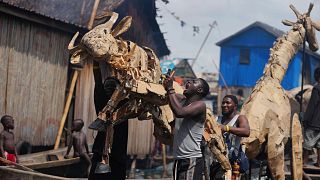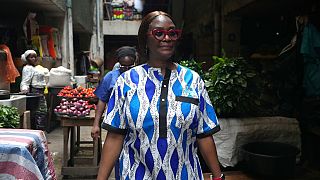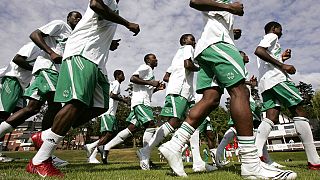Nigeria
A global team of humanitarian activists is working together on the front lines of today’s biggest crises to create a future of possibility, where everyone can prosper.
Mercy Corps has a mission to alleviate suffering, poverty and oppression by helping people rebuild secure and productive and just communities.
The group is part of the “Feed the Future Nigeria Rural Resilience Activity" of the U.S. Government's global hunger and food security initiative and recently held a field trip on food security and agribusiness in a complex market system in North East Nigeria.
Margrata Aswani is the Chief of the Party of Rural Resilience Activity and says they focus on women, youth and men and look at the different needs of the different participants to try and deploy appropriate products.
“We want to see how products can be appropriately packaged for the rural and urban poor in the North East," she says.
"We have been able to reach 334,000 individuals through the work that we do directly mostly through our partners."
Since 2019, the group has partnered with communities to help them recover and rebuild while addressing root causes of conflict, insecurity and inequality. Their work is expected to impact the lives of over 600,000 people across Nigeria.
“So while we are increasing the revenue of our farmers, livestock producers, micro-enterprise owners, there are factors in the economy that are happening at the global level and in Nigeria that are affecting the cost of food, the cost of fuel, cost of inputs and now we have floods affecting productivity," Aswani added.
A female IDP Farmer, Hanatu Bartholomew says the project has helped her relatives and appeals to the authority for more seedlings and input to uplift her farm.
“The farm is helping me even my family, this is where I am living and getting everything I need," she said.
Head of Asmau Farm, Tukur Muazu says they are so lucky the last flood in the country, which destroyed many farms, did not affect them. He added that the region has faced insecurity.
“Availability of foundation seeds that is one," he explains. "Secondly availability of funds, for our contract farmers. "We have to secure the basic things for them to start, you must make fertiliser, insecticides, pesticides, available. You must make sure the tractors are in place and all these require a lot of money and it’s a major challenge.”
The Feed the Future Nigeria Rural Resilience activity is a five-year, $45 million program by the US Agency for International Development (USAID) to facilitate economic growth in vulnerable, conflict-affected areas, by promoting systemic change in market systems.
The project is implemented by Mercy Corps, in partnership with the International Fertilizer Development Center (IFDC) and Save the Children (SCI), in the Northeast states of Adamawa, Bornu, Gombe and Yobe.











00:47
Ghana: President Mahama suspends Chief Justice Gertrude Torkornoo
Go to video
Police rescue 33 West Africans from a human trafficking scam in Ivory Coast
Go to video
Pope Francis' funeral scheduled Saturday April 26
Go to video
Al-Qaida-linked militants attack a strategic town in Somalia
Go to video
Trump administration threatens Harvard over foreign student visas and protest ties
Go to video
The EU moves to fast-track asylum claims by migrants from 7 countries to speed deportation